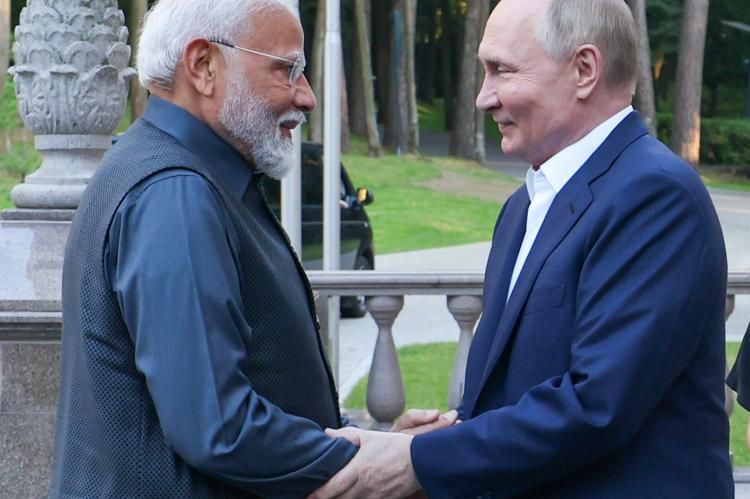It’s Time to Reconfigure Indo-Russia Relations
By Rohit Srivastava

Prime Minister of India Narendra Modi, on Monday, arrived in Moscow for 22nd Indo-Russian Summit meetings with Russian President Vladimir Putin. This is first meeting of the two leaders since they met in September 2022 in Samarkand during the Shanghai Cooperation Organisation (SCO) Summit in Uzbekistan.
Prime Minister, before embarking on the visit, in a statement said, “The Special and Privileged Strategic Partnership between India and Russia has advanced over the past ten years, including in the areas of energy, security, trade, investment, health, education, culture, tourism and people-to-people exchanges.”
Referring to Russian president as personal ‘friend’, Indian prime minister added that they would review “all aspects of bilateral cooperation” and share “perspectives on various regional and global issues.”
Upon landing in Moscow where he was received by Russia's First Deputy Prime Minister Denis Manturov at Vnukovo airport. Upon arrival PM Modi, in a tweet, said, “Looking forward to further deepening the Special and Privileged Strategic Partnership between our nations, especially in futuristic areas of cooperation. Stronger ties between our nations will greatly benefit our people.”
Later President Putin hosted PM Modi at his Novo-Ogaryovo residence. The bonhomie and personal confidence that the two leaders share was visible.
Need for Reconfiguration of Relationship
Prime Minister Modi is travelling to Russia after 2019 when he attended Eastern Economic Forum at Vladivostok. President Putin last visited India in December 2021 for 21st Annual Summit when two sides also held their first 2+2 meetings between foreign and defence ministers of the two countries.
Between December 2021 and July 2024, the world that we live –in has changed to large extent. The geopolitical and geostrategic scenario of the world has changed dramatically. There is immense stress in the world, thanks to pandemic which shook the foundation of global economy and also due to the two major ongoing conflicts between Russia and Ukraine and Israel and Hamas. They have reshuffled the global power dynamics.
As the world is transitioning into a new political, economic order, and with the challenges that climate changes is throwing at the world, all nations needs to recalibrate their economic and industrial ecosystem.
With the sudden emergence of Artificial Intelligence and Data Analytics as a prominent tool in day-to-day business, communication and social media are impacting every aspects of world in unanticipated ways. We are also witnessing revival of battle of attrition and a rapid obsolescence of existing weapon systems and crumbling of nuclear and non-nuclear deterrence.
Given the new circumstances and challenges, it is the best time to reconfigure the bilateral relationship.
Bilateral Economic Relations
The Indo-Russian ‘Special and Privileged Strategic Partnership’ is primarily based on energy and defence trade wherein India is the market and Russia is the exporter. In the financial year 2022-23, the bilateral trade between the two nations was touching US $40 billion, where Russian imported just around US $3.14 billion rest was Indian import. This is was 300 percent jump in the bilateral trade from the US $13 billion in the previous financial year. This jump was primarily due to India shifting its energy import to Russia. Indian export remains stable around US $3.14 billion. The bilateral trade has reached US $65 billion in 2023-24 where in India has imported worth US $ 60 billion. Russian import primarily consists of electrical machinery, pharmaceuticals, organic chemicals, iron & steel, apparels, tea, coffee, vehicle spare parts.
There is a massive imbalance. This needs to end. There are challenges pertaining to currency exchange, transportation of goods and preference of Indian corporate for Western companies. Two sides need to work out these challenges. The transition in technology is creating business opportunities that need to be tapped.
It would be impossible for any nation to develop all the technologies and products required to achieve self-reliance – a necessity in the transitioning world. Nations need reliable and stable partners who can co-develop technologies and products for global market. Partner nations would have work to according to each other’s strength and weakness.
In near future global economy will witness a rebooting. West derives its economic might from hard currencies US Dollar and Euro which allows them to dominate global financial system. The Euro and dollar exchange rate gives West unlimited ability to manipulate prices in their favour. For India to achieve trade surplus in current setup is a daunting task unless, India is able get a significant part of Chinese production of western goods. This is a daunting task and would take decades. The other way is to dominate the future through innovative products from emerging technologies. This would need to long-term technology partnership. One way to deal with this, as suggested by PM Modi, is by focusing on cooperation on futuristic areas. The two sides can create an environment where businesses from both sides could explore opportunities and form ties. The bilateral collaboration must be organic. India and Russia together can produce goods of future.
The two friendly nations can develop, utilising each other’s strength, an industrial ecosystem, akin to EU and US, wherein they co-develop and co-produce goods for future markets ranging from consumer goods to high technology products in transport, medical, aviation and other sectors. Indian market is big and complex enough to provide the requisite experience and revenue to make them competitive for global market.
It is necessary to work-out a framework for Indo-Russian scientific, techno-industrial, agricultural and financial ecosystem. This can only be achieved if the two sides, together in a concerted manner, overcome the barriers and challenges. It would not be an easy endeavour but worth pursuing.



